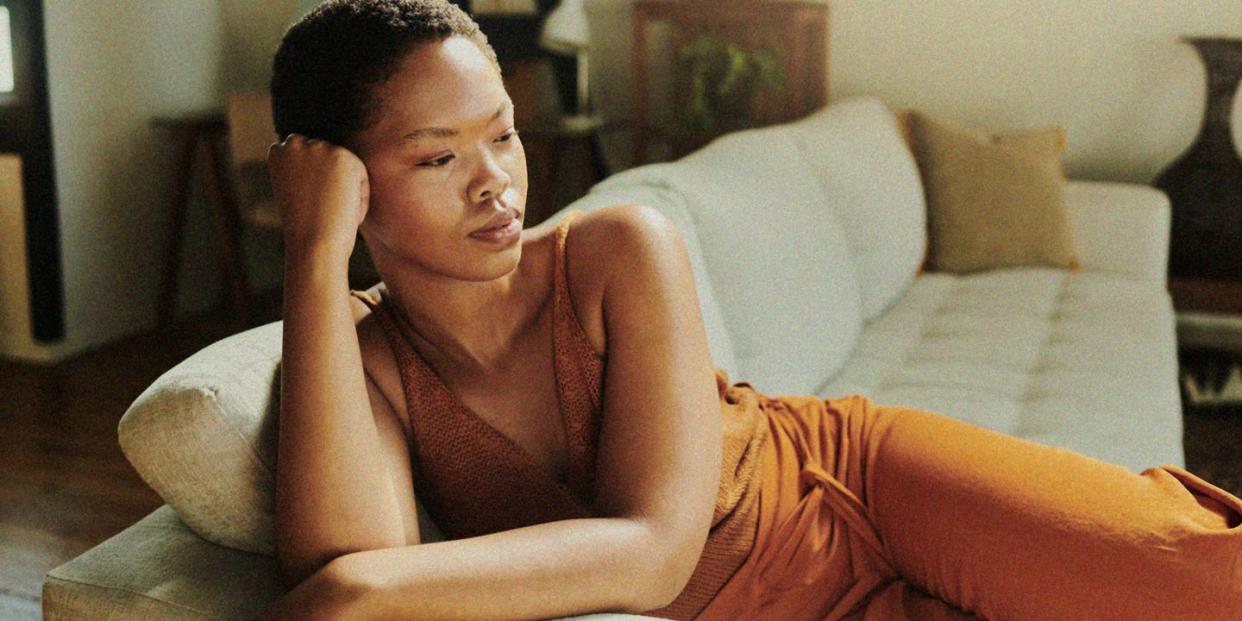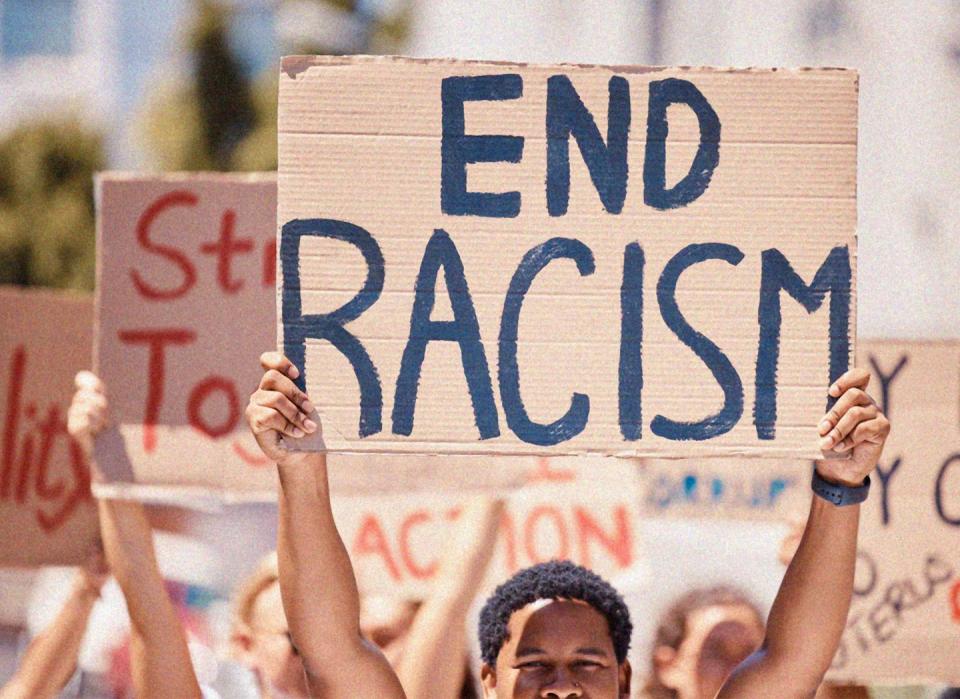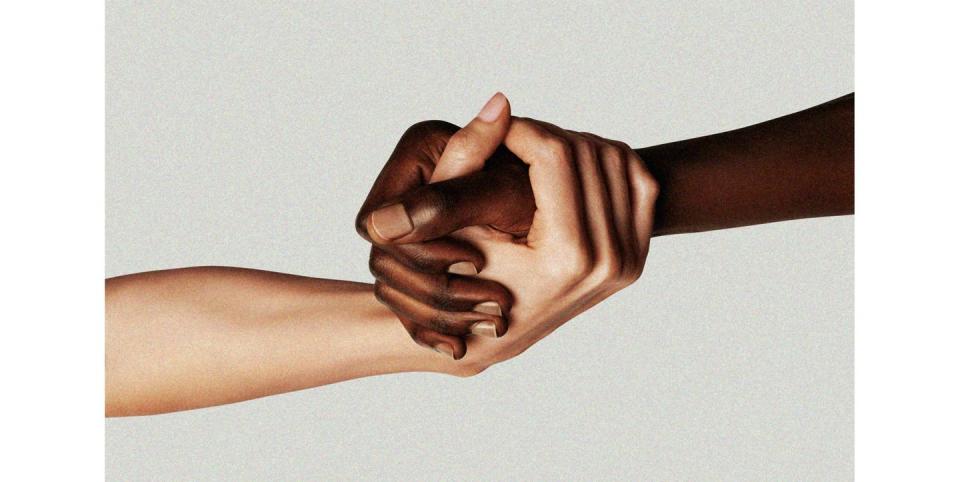'Self-care is an anti-racist tool - why hasn’t society picked that up yet?'

I was sitting on a train when an incident happened that changed my life. “Do you have a fucking passport to get into the country?” I heard a man say to the inspector, who had just asked to check his ticket.
The inspector, rightfully, called out the passenger’s racism.
“How can I be racist; I have two mixed-race children?” the man retorted. “You’re always using the Black card!”
My hand was shaking as I set my phone to record. I don’t know what came over me, but then words started coming out of my mouth too. “Your poor children, having a dad who speaks like that,” I said. The packed train carriage looked on. “What you just said is racist. What does having a passport have to do with your ticket?”
The entire altercation was loud. It was public. And yet, the only people who said anything were the two Black people in the space – me and the inspector. There was – and still is – no doubt that the majority of people knew they were witnessing racism. But it’s not the first time that those of us who experience it first-hand are the only ones calling it out.
This was in 2019. The Black Lives Matter uprising, sparked by the tragic murder of George Floyd at the hands of a police officer, happened shortly after – and I watched as almost everyone I knew posted black squares of ‘solidarity’ on their social media feeds.

In May 2020, a friend asked if they could share the video I’d recorded on the train. They wanted to show the everyday occurrences of racism in the UK, which many still deny exist. I agreed, and so the video was posted on X (Twitter), where it was viewed millions of times.
Some responses praised my ‘bravery’, while countless white people chimed in with missives like ‘Wow, I can’t believe this really happens in the UK’. My sister Naomi and I realised that there was a real, stark need for an educational resource centred on racial injustice. Statistics that are still pertinent today – that Black people are nine times more likely to be stopped and searched by the police than white people, or that Black women are four times more likely to die during childbirth – made it feel all the morefelt urgent.
We were inspired to set up our account @everydayracism_ to offer that resource. We began creating content to teach our audience how to be proactively anti-racist and we’re now the largest anti-racism Instagram platform in the country.
While those video comments that uttered disbelief at the treatment of Black people were made almost four years ago now, sadly not enough has changed. And people are still in denial about the state of racism not only around the world, but right here on our doorstep in the UK.
So, how do we move forward? Well, I believe it involves hard work and deep introspection in equal measure.
Sitting with your discomfort
The murder of George Floyd shook the world – it was a global political, social, and cultural shift. Suddenly a wave of people appeared to realise ‘Oh, I can’t just say I’m not racist, I need to actively be anti-racist.’ And they said so publicly, too.
Change takes time, but having spent the last few years travelling up and down the country delivering anti-racism training to businesses and schools, I’ve seen first-hand that too many people are still in the embryonic stages of understanding the true meaning of the word ‘racism’. It’s not just about individual acts of violence or aggression, but rather power structures that allow the dominance of whiteness at a systemic level.
The truth is, you can attend all the workshops your company puts on, read all the anti-racism books in the world and listen to podcasts until your ears bleed, but if we don’t have the skills to form healthy relationships with others – especially those who are different from us – or have an awareness of how to resolve uncomfortable situations, nothing will really change.
This isn’t to say that we have to keep up dialogue and relationships with people who are unsafe to be around (personally, I’ve had to cut off a racist uncle), but a healthy friendship means even if you have opposing opinions, they’ll listen to your lived experiences – without turning it into a debate. It’s about respect: hearing when I do and don’t want to talk, and knowing I can raise when something is offensive to me without being met with a defensive response.
The sad reality is that racism and other forms of discrimination, from ableism to sexism and transphobia, are still rife. Despite the signposting to the right reading materials and podcasts there’s a racism that is deeply rooted in our society, we swim in it. It’s more than what we learned about in school. And a lot of the time it’s so insidious, we don’t even notice it.
So, how can we fight what we can’t see and still sadly don’t really seem to have a grasp of? It’s about us all doing work as individuals to better the collective.
We must all invest in a deeper understanding of ourselves and how we all respond when faced with conflict or issues of prejudice. It involves some tricky work and sitting with discomfort.
The reality is that it’s not about how ‘nice’ or ‘kind’ you are, you can be the most charitable person on the planet and still have prejudiced thoughts. It’s about having profound empathy, where we actively acknowledge and understand the pain of others, contemplating our own role in their struggles, even when it feels awkward or unpleasant.
It involves considering factors like intersectionality too. Recognising our privileges, such as our education, absence of disability, and access to necessities. It demands a conscientious effort to understand and engage with how others navigate the complexities of the world. It goes beyond mere awareness: it requires active participation and a commitment to making a positive impact.

One thing I’ve been thinking about lately is how do I really interrogate my bias? Even as a Black woman, I know I have it, but what does that really mean? As part of this process, if I look at someone and a thought comes into my head about them, I ask myself three questions: Why did I think that? Where do I think that thought came from? And would I think that if they looked like someone else? Whatever comes up, I won’t shame myself in response, but rather try and unpick why these thoughts have developed and do better moving forward.
It’s never a comfortable feeling when we are challenged, but we have to start interrogating why our natural default is so often not to empathise, and instead shut the conversation down. I believe shame, guilt and not feeling safe are the emotions we need to untangle. But how do we do that, in order to truly achieve racial equality?
Working through guilt and shame
Expert integrative relational therapist Alexander White-Huggins, a member of the Black, African and Asian Therapy Network (BAATN), explains that it “requires the courage to both hold ourselves accountable alongside maintaining self-compassion – as without the latter, there’s the risk of remaining stuck in a guilt-shame cycle”. If we can “identify and own the parts of ourselves that we’re less comfortable with, we’re less likely to project those aspects onto others or internalise what isn’t ours,” he adds.
White-Huggins notes that those who perpetuate racism must develop an awareness of themselves that allows them to interrogate what might be behind their need to dominate those they perceive to be of a different racial identity.
For those who experience racism directly, it means developing an awareness of themselves and who they are, to reduce the potential of identifying with and internalising the idea of being ‘less than’. In turn, this frees up energy for resistance.
To move forward, we also have to allow ourselves the time and space to heal from our experiences; there is often deep generational trauma at play, yet we are frequently put in the position of having to undo the damage of systemic racism ourselves. As someone who experiences racism (and pours so much energy into delivering Everyday Racism training), I can’t understate the importance of recharging, reclaiming, and prioritising your own self-care as part of this fight. It’s a key tool for creating an anti-racist society that is often overlooked.
This can look different for different people. It might be stepping away from social media, meditation, allowing yourself to daydream for five minutes, exercising, or even having a nap. I’m mindful that resting isn’t a right that my ancestors were given – and because of capitalism, is something that’s even seen as a form of rebellion.
Author and activist Tricia Hersey, articulates this powerfully in her book Rest is Resistance. She writes that, amid capitalism and white supremacy, we must “free ourselves from the grind culture and reclaim our lives”.
It won’t happen overnight: we are trying to undo years of structures and pushing against a ‘rise and grind’ culture that doesn’t encourage us to put our wellbeing first. But there are ways we can start, even if it’s just by working out what self-care and rest looks like to us as individuals. No matter your race – we all deserve rest, we all deserve to be looked after and developing this self-compassion will help with interrogating your bias too.
But if you’re someone who does not experience racism, remember it’s a privilege to be able to look away and to not be exhausted by that as well.
You can also join the Everyday Racism Book Club, a book club that opens up your world to different voices and experiences, and is a safe space to learn together, or donate to the Everyday Racims Patreon: each month there’s a learning series to discuss current affairs and anti-racism together.
You Might Also Like

 Yahoo News
Yahoo News 
